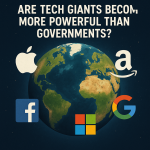In the 21st century, power has increasingly shifted from political corridors to the boardrooms of Silicon Valley. Once seen as mere tools of convenience, today’s tech companies — Google, Apple, Amazon, Meta, Microsoft, and others — wield influence so vast that it prompts a provocative question: Are tech giants becoming more powerful than governments?
Governments traditionally controlled information through state media, regulations, and diplomacy. But today, tech platforms curate what billions see, read, and believe. Facebook’s algorithm can sway public opinion; Twitter (now X) has become the frontline of political discourse. Google’s search engine dictates which information is prioritized — effectively shaping knowledge itself.
This has led to scenarios where national elections, protests, and even riots are amplified or dampened based on how tech platforms function — or choose to intervene.
In terms of GDP comparisons, some tech companies generate more annual revenue than many nations. For instance, Apple’s valuation surpasses the GDP of over 150 countries. Amazon’s logistics network rivals national postal systems. Google and Meta dominate global advertising — outpacing traditional media outlets and controlling the main gateways to digital revenue.
This economic might allows tech firms to influence labor markets, dictate global trends, and lobby against national laws — often successfully.
Governments create laws, but tech companies shape them through intense lobbying. In the U.S., lobbying expenditure by tech companies is among the highest across industries. In Europe and India, these companies have delayed or diluted digital privacy laws using legal pressure and economic bargaining.
Tech firms are also creating quasi-legal ecosystems. Think of Meta’s oversight board (often referred to as a "Supreme Court of Facebook") — a private panel deciding content moderation disputes globally. This is corporate self-regulation replacing state authority.
Governments themselves now depend on private tech infrastructure:
This growing dependency shifts control from governments to corporations that are unelected, transnational, and profit-driven.
While these companies have driven innovation, job creation, and connectivity, unchecked power brings risks:
More concerning is that users have little say, and governments lack the agility to regulate at the pace of technological growth.
The line between national authority and corporate supremacy is blurring. Tech giants have moved beyond being service providers — they are global entities with economic, social, and political power that often rivals, or even surpasses, that of governments.
As citizens and future professionals, we must ask: Do we want to live in a world run by code instead of constitutions?

Control Over Information
Governments traditionally controlled information through state media, regulations, and diplomacy. But today, tech platforms curate what billions see, read, and believe. Facebook’s algorithm can sway public opinion; Twitter (now X) has become the frontline of political discourse. Google’s search engine dictates which information is prioritized — effectively shaping knowledge itself.
This has led to scenarios where national elections, protests, and even riots are amplified or dampened based on how tech platforms function — or choose to intervene.
Example: The 2016 U.S. election saw Facebook and Cambridge Analytica at the center of a data misuse controversy, raising alarms globally about the power of digital manipulation.
Economic Supremacy
In terms of GDP comparisons, some tech companies generate more annual revenue than many nations. For instance, Apple’s valuation surpasses the GDP of over 150 countries. Amazon’s logistics network rivals national postal systems. Google and Meta dominate global advertising — outpacing traditional media outlets and controlling the main gateways to digital revenue.
This economic might allows tech firms to influence labor markets, dictate global trends, and lobby against national laws — often successfully.
Policy and Regulation Power Play
Governments create laws, but tech companies shape them through intense lobbying. In the U.S., lobbying expenditure by tech companies is among the highest across industries. In Europe and India, these companies have delayed or diluted digital privacy laws using legal pressure and economic bargaining.
Tech firms are also creating quasi-legal ecosystems. Think of Meta’s oversight board (often referred to as a "Supreme Court of Facebook") — a private panel deciding content moderation disputes globally. This is corporate self-regulation replacing state authority.
Infrastructure and Ecosystem Dependency
Governments themselves now depend on private tech infrastructure:
- Cloud services (Amazon AWS, Google Cloud) host sensitive national data.
- AI development and cybersecurity are outsourced to private firms.
- Even health systems during COVID relied on Apple-Google contact tracing frameworks.
This growing dependency shifts control from governments to corporations that are unelected, transnational, and profit-driven.
Should We Be Worried?
While these companies have driven innovation, job creation, and connectivity, unchecked power brings risks:
- Privacy violations
- Manipulation of democratic processes
- Global monopolies
- Limited public accountability
More concerning is that users have little say, and governments lack the agility to regulate at the pace of technological growth.
Conclusion
The line between national authority and corporate supremacy is blurring. Tech giants have moved beyond being service providers — they are global entities with economic, social, and political power that often rivals, or even surpasses, that of governments.
As citizens and future professionals, we must ask: Do we want to live in a world run by code instead of constitutions?


